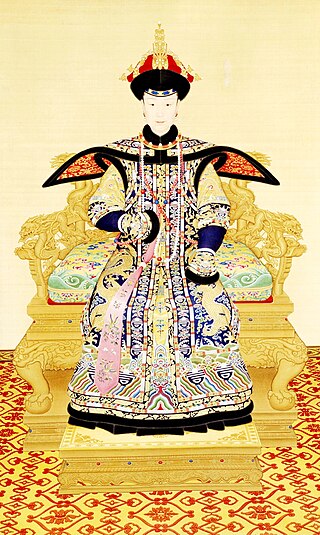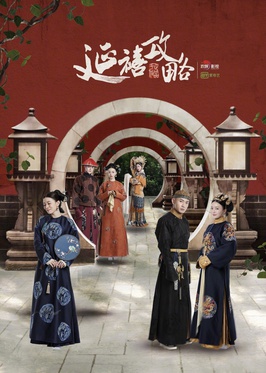
The Xianfeng Emperor, also known by his temple name Emperor Wenzong of Qing, personal name Yizhu, was the eighth emperor of the Qing dynasty, and the seventh Qing emperor to rule over China proper. During his reign, the Qing dynasty experienced several wars and rebellions including the Taiping Rebellion, the Nian Rebellion, and the Second Opium War. He was the last Chinese emperor to exercise sole power.

The Daoguang Emperor, also known by his temple name Emperor Xuanzong of Qing, personal name Mianning, was the seventh emperor of the Qing dynasty, and the sixth Qing emperor to rule over China proper. His reign was marked by "external disaster and internal rebellion". These include the First Opium War and the beginning of the Taiping Rebellion which nearly brought down the dynasty. The historian Jonathan Spence characterizes the Daoguang Emperor as a "well meaning but ineffective man" who promoted officials who "presented a purist view even if they had nothing to say about the domestic and foreign problems surrounding the dynasty".

The Bordered Yellow Banner was one of the Eight Banners of Manchu military and society during the Later Jin and Qing dynasty of China. The Bordered Yellow Banner was one of three "upper" banner armies under the direct command of the emperor himself, and one of the four "left wing" banners. The Plain Yellow Banner and the Bordered Yellow Banner were split from each other in 1615, when the troops of the original four banner armies were divided into eight by adding a bordered variant to each banner's design. The yellow banners were originally commanded personally by Nurhaci. After Nurhaci's death, his son Hong Taiji became khan, and took control of both yellow banners. Later, the Shunzhi Emperor took over the Plain White Banner after the death of his regent, Dorgon, to whom it previously belonged. From that point forward, the emperor directly controlled three "upper" banners, as opposed to the other five "lower" banners. Because of the direct control of the three upper banners, there was no appointed banner commanders as opposed to the other five. The emperor's personal guards and guards of Forbidden City were also only selected from the upper three banners.

The Niohuru were a prominent Manchu clan during the Qing dynasty. The clan had inhabited the Changbai Mountains since as early as the Liao dynasty. The clan was well known during the Qing dynasty for producing a variety of consorts of all ranks for emperors, several of whom went on to become mothers to reigning emperors. Prominent people who belonged or trace heritage to the Niohuru clan including famed Manchu warrior Eidu, his son the high official Ebilun, the Empress Dowager Ci'an, the infamous corrupt official Heshen, the contemporary concert pianist Lang Lang and Lang Tsuyun, Taiwanese TV, movie and stage actress, singer and producer.

Yinxiang, formally known as Prince Yi, was a Manchu prince of the Qing dynasty. The thirteenth son of the Kangxi Emperor, Yinxiang was a major ally of his brother Yinzhen during the latter's struggle for the succession of the throne. He was made a qinwang during Yongzheng's reign and became one of his closest advisors. He died eight years into the reign of the Yongzheng Emperor and was memorialized with top honours by the emperor. When he died, his title was granted "iron-cap" status and became perpetually inheritable, one of the only twelve such princes in Qing dynasty history.
Gūwalgiya was one of the most powerful Manchu clans. It is often listed by historians as the first of the eight prominent Manchu clans of the Qing dynasty. After the demise of the dynasty, some of its descendants sinicized their clan name to the Han Chinese surname Guan (關).
Tunggiya is the name of a Manchu clan.
Gege (Manchu: ᡤᡝᡤᡝ; Chinese: 格格; pinyin: Gégé; Wade–Giles: Ko2-ko2) is the Manchu word for an unmarried daughter. During the Qing dynasty, it was the Manchu style of an imperial-born princess of an emperor. Daughters of all imperial princes above the rank of jiangjun also used the same title.

Empress Xiaoxianchun, of the Manchu Bordered Yellow Banner Fuca clan, was the first wife of the Qianlong Emperor. She was empress consort from 1738 until her death in 1748.

Empress Xiaojingcheng, of the Manchu Plain Yellow Banner Borjigit clan, was a posthumous name bestowed to a consort of Mianning, the Daoguang Emperor. She was honoured as Empress Dowager Kangci during the reign of her step-son, Yizhu, the Xianfeng Emperor. She was the only Qing empress dowager who was neither her husband's empress consort nor emperor's mother.

Empress Xiaoyichun, of the Manchu Bordered Yellow Banner Weigiya clan, was a consort of the Qianlong Emperor. Her eldest surviving son became the Jiaqing Emperor.

Consort Shu, of the Manchu Plain Yellow Banner Yehe Nara clan, was a consort of the Qianlong Emperor. She was 17 years younger than him.

Nara is a clan name shared by a number of royal Manchu clans, sometimes also transliterated as Nalan or Nalland. The four tribes of the Hūlun confederation (扈倫四部) – Hada, Ula, Hoifa and Yehe – were all ruled by clans bearing this name.

Fuheng, courtesy name Chunhe (春和), was a Qing dynasty official from the Manchu Fuca clan and the Bordered Yellow Banner of the Eight Banners, and was a younger brother of the Empress Xiaoxianchun. He served as a senior minister at the court of his brother-in-law, the Qianlong Emperor from the 1750s to his death in 1770. He is best known for leading the Qing troops in the fourth and last invasion of Burma in the Sino-Burmese War (1765–1769).
Yongrong was a Manchu prince and calligrapher of the Qing dynasty in China. He was born in the Aisin Gioro clan as the sixth son of the Qianlong Emperor; his mother was Imperial Noble Consort Chunhui.

Story of Yanxi Palace is a 2018 Chinese television series recounting the struggles of a palace maid in the court of the Qianlong Emperor. It was created by Yu Zheng, with original screenplay written by Zhou Mo, and later developed into a novel by Xiao Lianmao. Starring Wu Jinyan, Charmaine Sheh, Qin Lan, Nie Yuan, Tan Zhuo and Xu Kai, the series premiered on IQIYI from July 19, 2018 to August 26, 2018. During its run it was streamed more than 15 billion times.
Uya was a clan of Manchu nobility.
Sirin Gioro was a clan of the Manchu nobility, one of the prominent Gioro family. The other clans of Gioro Hala were Aisin Gioro (爱新觉罗), the ruling clan from 1616 to 1912, Irgen Gioro (伊尔根觉罗) and Šušu Gioro (舒舒觉罗). The clan belonged to the Bordered Blue Banner. The clan members inhabited the area ranging from Nimaca, Hoifa, Changbai Mountains, Jianzhou, Ningguta and Hada.
Yongxing was the Qianlong Emperor's 11th son and Qing Dynasty imperial prince.
Yuntao was a Qing dynasty imperial prince and the 12th son of the Kangxi Emperor. Yuntao was rather a crony of the Yongzheng Emperor and his adoptive brother, which helped him persist in the succession war. He became the first bearer of the Prince Lü of the First Rank title.











